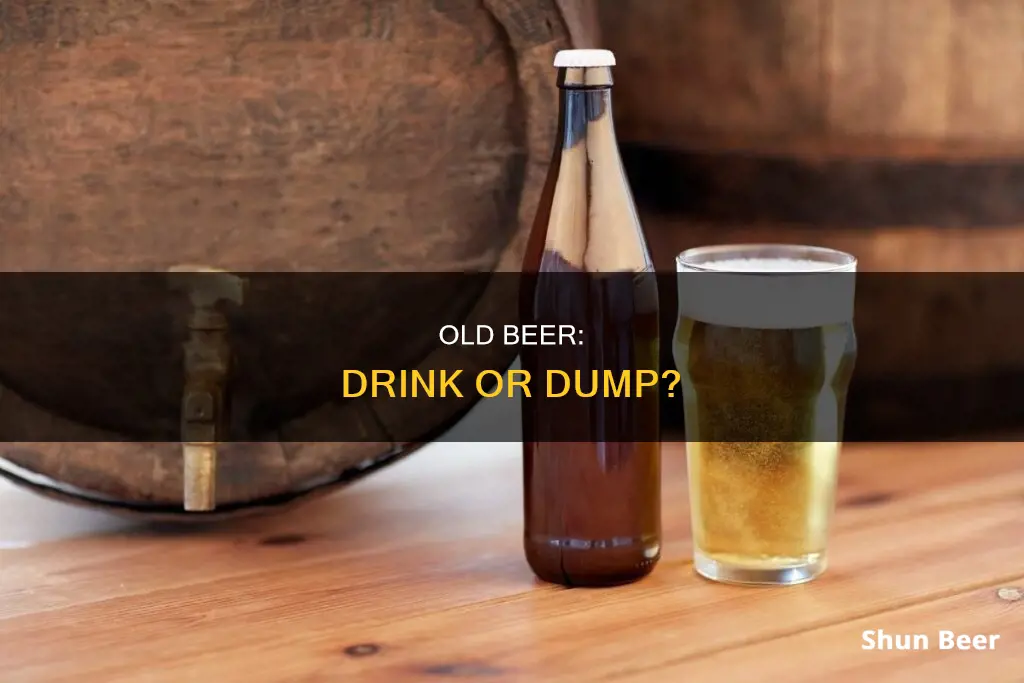
Beer is a perishable product that can be consumed years after its expiration date, but its flavour will degrade over time. The taste of beer changes due to oxidation, which is caused by the small amount of oxygen present in the beer. The speed of oxidation is affected by temperature fluctuations, so it's best to store beer in a cool, dark place. The type of beer also determines how long it stays tasting reasonably fresh. Stronger beers, like porters or imperial stouts, can last between 5 and 10 years after brewing, while standard strength beers like pale ales, IPAs and lagers stay fresh for 6 months to 2 years.
| Characteristics | Values |
|---|---|
| Safety | Beer doesn't expire and is safe to drink, even if it's old, as long as the packaging is intact and it has been stored properly. |
| Taste | The flavour of beer degrades over time. It may taste flat, stale, or sweeter than usual. |
| Factors Impacting Flavour | Packaging, light exposure, oxygen, and temperature can all impact the flavour of beer over time. |
What You'll Learn

Is year-old beer safe to drink?
ShortYes, it is safe to drink beer that is a year old. Beer
LongThe short answer is that beer doesn't expire in the same way that food does. It is
The first thing to note is that the
The second thing to note is that the beer will have been treated by being
However, the taste of the beer will change over time. This is because there is always a
A beer's
The speed of these reactions
In summary, year-old beer is safe to drink as long as the
Does Helium Beer Work? The Science Behind It
You may want to see also

How does year-old beer taste?
While old beer is safe to drink in most cases, its flavour will change over time. A year-old beer will likely taste flat and stale, with a stronger, sweeter flavour.
Oxidation
Year-old beer will have undergone a process called oxidation, in which oxygen inside the packaging interacts with the compounds that give beer its flavour and aroma. Some of these compounds will break down and disappear, while others will change form and create a stronger taste. This results in a flat taste, with other compounds becoming more intense and creating a sweeter, more syrupy, caramel-like, or toffee-ish flavour.
Hoppiness
The "hoppiness" of a beer will also diminish with age. Hop aromas are time-sensitive, so the piney, citrusy, or floral hop aromas that characterise a hop-forward beer will not be present in older beers. The bitterness imparted by hops will remain, but the bright, refreshing sharpness of fresh beer will be lost.
Skunking
Skunked beer is caused by light exposure, not temperature swings. The chemicals in hops react poorly to ultraviolet light, so beer stored in clear or light-coloured glass bottles will develop a signature "skunk-like" flavour if left out. Brown bottles and aluminium cans are effective at blocking out light and preserving the flavour of the beer.
Heat
Heat acts to speed up the process of oxidation, so beer stored in hot conditions will go stale faster.
Alcohol Content
The alcohol content of beer also affects how its flavour changes over time. Neat alcohol will stay tasting the same forever, and higher alcohol content in beer results in a longer shelf life. Standard strength beers, such as pale ales, IPAs, and lagers, will stay fresh for between 6 months and 2 years after brewing, while stronger beers like porters or imperial stouts can taste good for between 5 and 10 years.
The Magic of Bottoms-Up Draft Beer: How Does It Work?
You may want to see also

What causes beer to go bad?
Beer is made from organic plant ingredients that will eventually decay. However, unlike milk, beer doesn't expire. It doesn't become unsafe to drink with age, but its taste will change.
Oxidation
Oxygen in the beer packaging interacts with the compounds that give beer its flavour and aroma. Some of these compounds will break down and disappear, while others will change form and create a stronger taste. This process is called oxidation and will give the beer a stale, flat, or cardboard-like flavour.
Loss of "Hoppiness"
Hop aromas are time-sensitive. The bitterness that hops impart to the beer will remain, but any piney, citrusy, or floral hop aromas will not.
Skunked Beer
Skunky beer is caused by exposure to light, specifically ultraviolet light. Hop compounds are sensitive to light and can become "light-struck", which gives off an unpleasant skunky taste. Beer bottles are usually made of dark-coloured glass to block out UV light, but aluminium cans are even better at blocking out UV rays.
Heat
Heat speeds up the oxidation process and causes beer to stale faster. Major temperature swings can also affect the speed of oxidation, so it's best to store beer in a cool, dark place like a refrigerator, basement, or cool closet.
Morning Beer: Should You Drink Before Work?
You may want to see also

How to store beer to extend its life?
Beer is best stored in a cool, dark place. If you have room in your fridge, that is the best spot. If the fridge is full, keeping your beer in the basement or a cool closet is the next-best option.
- Keep it cool: The temperature the beer is exposed to will make a big difference in how long it stays tasting fresh. In most cases, the best option is to keep the beer refrigerated. That will slow down the oxidation process and keep the flavour and aroma for longer. For some beers, though, refrigeration won't be the right choice. If you're storing beer with live yeast, like wild or sour ales, the flavour needs to develop. The same goes for some imperial stouts and barley wines. It will be too cold for that to happen in a fridge. A good rule of thumb is to store the beer at the same temperature, or slightly warmer, than you'd drink it.
- Keep it dark: Exposure to sunlight can cause a chemical reaction in the beer, breaking down its flavour components until the beverage smells and tastes like skunk spray. That's why beer that has been exposed to sunlight for too long is said to have been "skunked" or "lightstruck".
- Keep it away from oxygen: Overexposure to oxygen leads to a breakdown of the beer's chemicals, which can significantly alter the taste. Bottled beer is at a higher risk of oxygen exposure than canned beer, and storing beer upright is an excellent way to minimise contact with the air. Keeping bottled beer on its side makes it prone to air leaks.
- Keep it sealed: If the packaging has been compromised – a dented or punctured can, for example – that might not be safe to drink. Check the exterior carefully before deciding whether to drink the beer. If the packaging is intact, you're safe to proceed.
- Keep it away from bacteria: Bacteria is an unusual culprit, as it can be hard for it to survive in beer thanks to its high alcohol content, which acts as a natural preservative. However, if bacteria do make their way into the beer, they will eat away at it. You can increase craft beer's shelf life by refrigerating it. The colder temperature also ends up slowing the life cycle of microbes that live in the beer, such as the yeast used to create it.
- Keep it away from heat: Heat will accelerate the chemical reaction, making the natural breakdown of large molecules into small molecules occur more rapidly. For beer, this simply means that in hotter conditions, it will age faster. Exposure to heat can cause two negative effects within beer: the production of dimethyl sulfide (DMS), which occurs at higher temperatures, and the breakdown of yeast due to prolonged exposure to heat.
Drinking Beer and Driving in Mississippi: What's Allowed?
You may want to see also

How to know if beer has expired?
Beer does expire, but it won't make you sick. The fermentation process used in brewing beer, along with its low pH level and alcohol content, makes it impossible for pathogens to survive. However, the taste will change over time, and it's generally agreed that fresh beer is the best beer.
How to Know if Beer Has Expired
Firstly, check the packaging for a "best before" date. Beer manufacturers will usually give an expiry date of 4 to 6 months after brewing, but this is just a guide. The precise longevity of your beer will depend on factors such as the type of beer, the packaging, and how it has been stored.
If there is no "best before" date, or if you want to know how long your beer will stay tasting reasonably fresh, there are some other factors to consider:
- Alcohol content: The more alcohol is present, the longer it will last. Standard strength beers, such as pale ales, IPAs, and lagers, will stay fresh for between 6 months and 2 years after brewing. Stronger beers, like porters or imperial stouts, can stay tasting good for between 5 and 10 years.
- Packaging: Cans are airtight and block out light, so beer in cans will usually last longer than beer in bottles. Glass bottles usually have some air at the top, and they are not 100% airtight, which means that oxygen can get inside and interact with the beer, affecting its flavour.
- Storage conditions: Beer should be stored upright in a cool, dark place, preferably a refrigerator. Heat causes beer to go bad more quickly, and light exposure can cause beer to develop a skunky odour and taste.
Even if your beer is past its "best before" date, it's probably still safe to drink. The easiest way to check if it still tastes fresh is to sample it. However, if the packaging has been compromised (e.g. a dented or punctured can), it may not be safe to drink.
Beer O'Clock: When Work Lunches Need a Lift
You may want to see also
Frequently asked questions
Yes, it is safe to drink a year-old beer. Beer is either pasteurized or filtered to eliminate bacteria, so it doesn't spoil easily.
No, the flavour will change over time. The beer may taste flat, stale, or sweeter, like sherry.
The beer's style, packaging, and storage conditions can all affect its flavour. Lighter, low-ABV beers tend to deteriorate faster than darker, high-ABV beers. Canned beer maintains its flavour better than bottled beer as it is better at blocking UV light and maintaining an airtight seal.
Standard strength beers like pale ales, IPAs, and lagers can stay fresh for between 6 months and 2 years after brewing. Stronger beers like porters or imperial stouts can last between 5 and 10 years.
Beer should be stored upright in a cool, dark place like a basement or refrigerator. Avoid exposing it to heat, sunlight, or frequent temperature changes.







